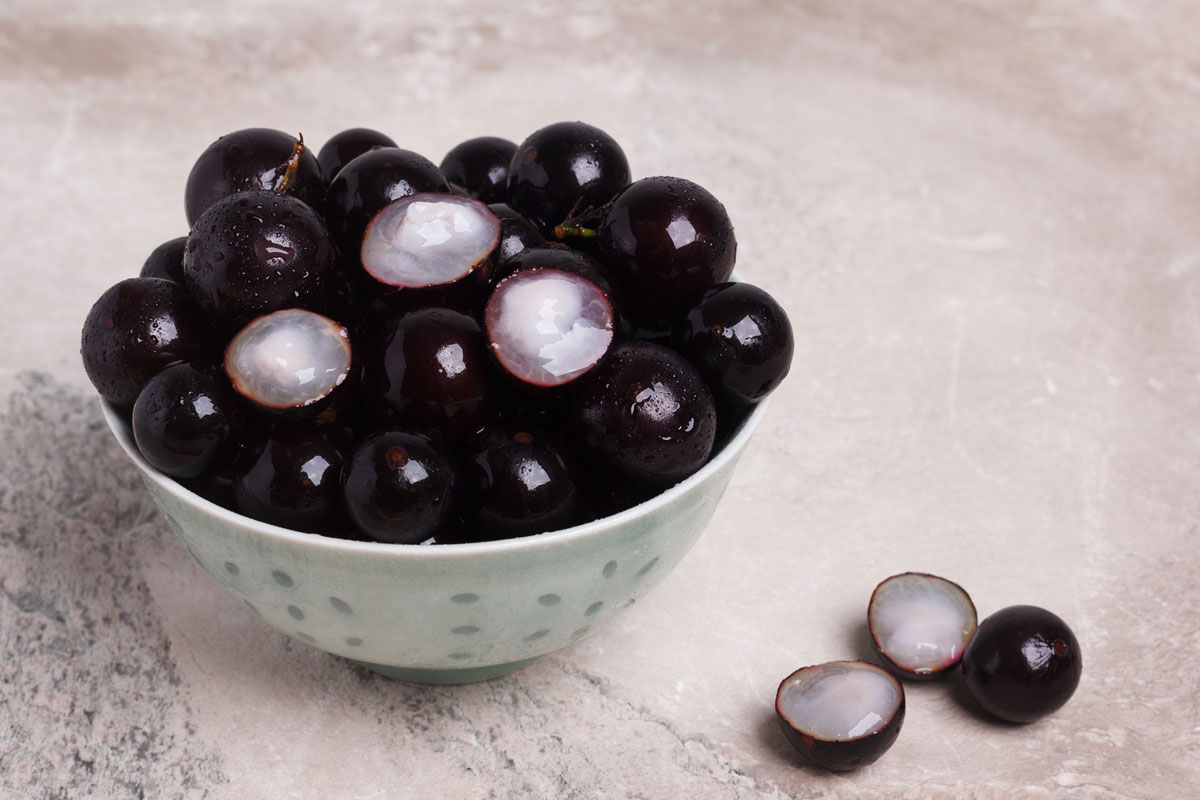
What is Jabuticaba? Imagine a fruit that grows directly on the trunk of a tree, looking like shiny, dark grapes. Jabuticaba is a unique fruit native to Brazil, known for its sweet, grape-like flavor and jelly-like texture. This intriguing fruit not only tastes delicious but also packs a punch with its health benefits. Rich in antioxidants, vitamins, and minerals, jabuticaba can boost your immune system and improve digestion. Curious about how to eat it? You can enjoy it fresh, make it into jams, or even ferment it into wine. Ready to learn more about this fascinating fruit? Let's dive into 15 amazing facts about jabuticaba!
Key Takeaways:
- Jabuticaba, also known as the Brazilian grape tree, grows directly on the trunk and branches, making it look like the tree is covered in grapes. It's a unique and delicious fruit native to Brazil.
- Jabuticaba is not only tasty but also packed with health benefits. It's rich in antioxidants, high in vitamin C, and contains dietary fiber, promoting a healthy immune system and digestion.
What is Jabuticaba?
Jabuticaba, also known as the Brazilian grape tree, is a unique fruit native to Brazil. Its scientific name is Plinia cauliflora. This fruit is not only delicious but also packed with interesting characteristics.
-
Grows on the Trunk: Unlike most fruits, jabuticaba grows directly on the trunk and branches of the tree. This unusual growth pattern makes it look like the tree is covered in grapes.
-
Native to Brazil: Jabuticaba is indigenous to Brazil, particularly in the states of Minas Gerais and São Paulo. It thrives in the tropical and subtropical climates of South America.
Nutritional Benefits of Jabuticaba
Jabuticaba is not just a treat for the taste buds; it also offers numerous health benefits. Here are some nutritional facts about this exotic fruit.
-
Rich in Antioxidants: Jabuticaba is loaded with antioxidants, which help combat free radicals in the body. These antioxidants can reduce the risk of chronic diseases.
-
High in Vitamin C: This fruit is an excellent source of vitamin C, which is essential for a healthy immune system. Vitamin C also aids in the absorption of iron from plant-based foods.
-
Contains Dietary Fiber: Jabuticaba is high in dietary fiber, which promotes healthy digestion. Fiber helps prevent constipation and supports a healthy gut.
Unique Characteristics of Jabuticaba
Jabuticaba stands out not just for its taste but also for its unique features. Here are some intriguing aspects of this fruit.
-
Short Shelf Life: Jabuticaba has a very short shelf life. Once harvested, it needs to be consumed quickly, usually within three to four days, or it will start to ferment.
-
Used in Various Products: Due to its short shelf life, jabuticaba is often used to make jellies, wines, and liqueurs. These products help preserve the fruit's unique flavor.
-
Medicinal Uses: In traditional medicine, jabuticaba is used to treat a variety of ailments, including asthma, diarrhea, and skin conditions. Its anti-inflammatory properties make it a versatile natural remedy.
Cultivation and Growth
Growing jabuticaba requires specific conditions and care. Here are some facts about its cultivation.
-
Slow Growing: Jabuticaba trees grow slowly. It can take several years for a tree to start producing fruit, but once it does, it can yield fruit multiple times a year.
-
Prefers Acidic Soil: These trees thrive in acidic soil with good drainage. They require regular watering but should not be waterlogged.
-
Tolerates Pruning: Jabuticaba trees can tolerate heavy pruning, which helps manage their size and shape. Pruning also encourages better fruit production.
Cultural Significance of Jabuticaba
Jabuticaba holds a special place in Brazilian culture. Here are some cultural facts about this fruit.
-
Popular in Festivals: In Brazil, jabuticaba is celebrated in various festivals. These events often feature jabuticaba-based foods and drinks, showcasing the fruit's versatility.
-
Symbol of Brazilian Cuisine: Jabuticaba is considered a symbol of Brazilian cuisine. It is often featured in traditional dishes and beverages, highlighting its cultural importance.
Fun Facts About Jabuticaba
Jabuticaba is full of surprises. Here are some fun and lesser-known facts about this fascinating fruit.
-
Attracts Wildlife: The fruit attracts a variety of wildlife, including birds and insects. These animals help with the pollination and dispersal of jabuticaba seeds.
-
Can Be Grown in Pots: Jabuticaba trees can be grown in large pots, making them suitable for urban gardening. This allows people to enjoy fresh jabuticaba even in small spaces.
Jabuticaba: A Unique Fruit Worth Knowing
Jabuticaba stands out as a truly unique fruit. Growing directly on the trunk of its tree, this Brazilian gem offers a burst of sweet, grape-like flavor. Rich in antioxidants, vitamin C, and anti-inflammatory properties, it’s not just tasty but also beneficial for health. The fruit's versatility shines in jams, wines, and even traditional remedies. Despite its short shelf life, its impact on Brazilian culture and cuisine is undeniable. Learning about jabuticaba opens a window to a fascinating part of nature. So next time you hear about this intriguing fruit, you'll know it's more than just a berry; it's a piece of Brazil's natural heritage. Keep an eye out for jabuticaba products—they might just become your new favorite treat!
Frequently Asked Questions
Was this page helpful?
Our commitment to delivering trustworthy and engaging content is at the heart of what we do. Each fact on our site is contributed by real users like you, bringing a wealth of diverse insights and information. To ensure the highest standards of accuracy and reliability, our dedicated editors meticulously review each submission. This process guarantees that the facts we share are not only fascinating but also credible. Trust in our commitment to quality and authenticity as you explore and learn with us.


